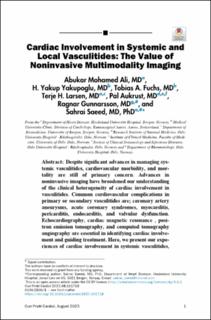Cardiac Involvement in Systemic and Local Vasculitides: The Value of Noninvasive Multimodality Imaging
Mohamed Ali, Abukar; Yakupoglu, H. Yakup; Fuchs, Tobias A.; Larsen, Terje Hjalmar; Aukrust, Pål; Gunnarsson, Ragnar; Saeed, Sahrai
Journal article, Peer reviewed
Published version

Åpne
Permanent lenke
https://hdl.handle.net/11250/3123396Utgivelsesdato
2023Metadata
Vis full innførselSamlinger
- Department of Biomedicine [710]
- Registrations from Cristin [9791]
Originalversjon
Current problems in cardiology. 2023, 48 (8), 101718. 10.1016/j.cpcardiol.2023.101718Sammendrag
Despite significant advances in managing systemic vasculitides, cardiovascular morbidity, and mortality are still of primary concern. Advances in noninvasive imaging have broadened our understanding of the clinical heterogeneity of cardiac involvement in vasculitides. Common cardiovascular complications in primary or secondary vasculitides are; coronary artery aneurysms, acute coronary syndromes, myocarditis, pericarditis, endocarditis, and valvular dysfunction. Echocardiography, cardiac magnetic resonance , positron emission tomography, and computed tomography angiography are essential in identifying cardiac involvement and guiding treatment. Here, we present our experiences of cardiac involvement in systemic vasculitides, covering most aspects of common cardiac complications based on a multi-modality approach to challenging (real-world) cases. As many cardiac manifestations are clinically silent, heart function should be systemically assessed by a multimodality imaging-based approach, including ECG, serial echocardiograms with strain imaging and 3D, and cardiac magnetic resonance to detect early signs of cardiac manifestations. This enables timely intervention and optimal medical treatment, which is essential for a better prognosis. There is a need for better and closer collaboration in clinical practice and research fields between cardiologists and rheumatologists.
